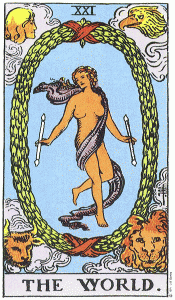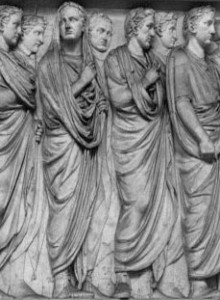“From of old I was poured forth…”
With a title like “In God/dess We Trust” some readers might be inclined to view this and the last two blog entries as “New Agey.” After all, they emphasize the return of a real experience of the feminine, of feeling, values, empathy, etc., to the predominantly masculine, thinking-oriented – in other words patriarchal – status quo. Mythfire, however, contests this “New Agey” label. With their attention to the ancient goddess figure of Iustitia or Themis, to the idea of feminine wisdom and foresight as the prudence within “jurisprudence,” and finally to the notion of Athena as trusted deity depicted on Athenian currency, these posts have attempted to show that rather than “New Agey” the feminine or feeling energies described are in fact, well, “Old Agey.”
Ultimately these ancient principles or values predate both the Judeo-Christian and Greek cultures on which most of Western civilization is based. And yet, as shown in the last blog entry, Athena’s owl still peeks out at us on the U.S. one dollar bill just as it did for over 500 years on Athenian currency. Not mentioned in the last entry was the fact that the owl can still be found on the Greek Euro today. That is to say, whether on the U.S. one dollar bill or the Greek Euro, the archetypal values of the feminine feeling function are still important in the 21st century. Yes they are old but they are also ever-renewing.
Second, although the blog title “In God/dess We Trust” was chosen to hopefully be somewhat provocative – an attention-grabber – it was also selected because through the included “/” the title conveys what is perhaps the central idea within the “Myth & Justice” series: a better appreciation of the mythological images and psychological energies associated with justice may help restore a desperately needed balance to our understanding of a healthy judicial system. Not only a God, then, but a Goddess as well. Not Zeus but Zeus and Athena. Masculine and feminine, thinking and feeling. To a certain extent, the first “In God/dess We Trust” blog put the Goddess somewhat ahead of God; the second placed her in the form of Athena somewhat behind Zeus. The present entry puts the feminine qualities and values of the Goddess where they should be and have been all along: right beside the masculine qualities of God.
The Hebrew Bible, or Old Testament as it is sometimes called, may be brought in to support this last statement. In this sacred text we find a similarly personified masculine and feminine duo: God and Sophia, or Wisdom. Note not only their relationship in the passage below but, just as important, the immediate linking of Wisdom and justice:
“I, Wisdom, dwell with experience and judicious knowledge. Mine are counsel and advice. Mine is strength, understanding. By me kings reign and lawgivers establish justice. By me princes govern and nobles, all the rulers of the earth. Those who love me I also love, and those who seek me find me…On the way of duty I walk, along the paths of justice. The Lord begot me, the first-born of his ways, the forerunner of his prodigies of long ago. From of old I was poured forth. When there were no depths I was brought forth, when there were no foundations or springs of water, before the mountains were settled into place. When he established the heavens I was there, when he made firm the skies above, when he fixed fast the foundations of the earth; when he set for the sea its limit so that the waters should not transgress his command; then I was beside him as his craftsman. I was his delight, day by day, playing before him all the while, playing on the surface of his earth; and I found delight in the sons of men.”*
The chapter from which this comes also includes the following verse: “I, wisdom, dwell with prudence, / And I find knowledge and discretion.”** So, once again, in the Judaic tradition as in the Greek and Roman, feminine wisdom is joined from the beginning with law-making and the establishment of order. We have prudence added to justice (or juris) to form jurisprudence. The “knowledge” and “discretion” furthermore suggest the discriminating evaluating nature of the rational feeling function which has been discussed throughout this “Myth & Justice” series.
As something of an aside, anyone familiar with the myth of Athena’s birth will also see parallels from the above passage about Wisdom with the birth of Athena. She was begotten by Zeus, was a companion or counselor to him as well as to humankind, and, like Wisdom, was also a “craftsman.” All of the figures discussed in this blog series, then, Themis/Iustitia, Athena, and now Wisdom, are all associated with the establishment or crafting of rules and structures that facilitate harmonious relations among people and thereby ensure the effective functioning of the collective or polis.
But what about the “delight” mentioned in the last verse of the above passage? This is a quite curious Bible verse. Like Athena among the Ithacans in The Odyssey, Wisdom dwells among humans, “playing on the surface of the earth,” and is thus an animating spirit and counselor for them just as she is in Heaven for the Hebrew God. She breathes a collective spirit into humans so that the collective might cohere and survive, ideally even thrive.
Further: delight, play, concern for the commonwealth, all speak to the role of feeling values in creating and maintaining order. Like Athena, for Wisdom the work of crafting a society is not meant to be drudgery. It is not work done only with the head, or thinking function, out of a sense of duty or righteousness. The above quote shows that crafting a cohesive collective is done out of love and yet it is even something more refined than that. Rather than an abstract or general (dare I say “New Agey”?!?) love for all humankind, the feeling function is about values that begin by discriminating likes from dislikes.*** We like order and dislike disorder/chaos. We like carefully designed city streets, arts which mirror back to people their emotional soul lives, a currency that provides a sense of divine providence and collective identity with its slogan: “In Goddess We Trust” (“Athena of the Athenians” – see previous blog). We like peace and prosperity and dislike war and poverty and so on.
James Hillman reveals another dimension to Wisdom’s “delight” and why it is hard to come by today:
“In other times, the grand, positive feelings of joy also were ritualized: a time for celebration, for carnival; collective forms for feeling were provided in terms of a divinity. How hard we have it to give exorbitant praise, to pull the magnanimous gesture, or to bask in what wholly makes us happy. We do not let ourselves sing, not merely because of a puritan morality or a super-ego, but because the [feeling] function cannot sing, and in the bourgeois, secular language of factional psychology, to let go is a sign of immaturity and inflation. The Gods must keep their distance and not enter the living room.”****
As Mythfire has been attempting to show, this distancing wasn’t always the case — a fact also confirmed by Barry Powell in this evocative passage from Classical Myth:
“In Athens an annual festival to Athena, the Panathenaea, celebrated her birthday. The festival was of special grandeur every fourth year, when a procession of high-born youths and maids carried sacred implements, led sacrificial animals, and rode in chariots to the Acropolis, bearing a freshly woven robe for the statue of Athena. The procession is shown on the inner relief sculpture of the Parthenon.”******
In other words, the Gods and Goddesses once entered our city streets as well as our living rooms. It was through these and other festive experiences that feminine and masculine energies such as wisdom and lawfulness – combined together as jurisprudence – were brought to life, given a (collective) body and even a robe! Back when people were still able to “let go” — as Hillman puts it — these festive energies were celebrated by a polis to the delight of all.
As Mythfire struggled to bring this entry to a close, a search for images appropriate to the blog’s theme brought an unexpected revelation: The World card in Tarot. Seen at the top of this blog post, The World has a figure front and center who is often equated with Sophia or Wisdom. And what is she doing? Dancing. Of course.*******
Esoteric traditions such as Tarot, then, echo the more exoteric or conventional Judaic and Greek traditions: Wisdom was poured forth into the world of old so that the opposites, i.e. human and divine, masculine and feminine, thinking and feeling and more could be united in a functional mutually satisfying harmony.
A harmony best expressed in dance…
****
Next Week: “Myth & Justice” concludes with posts on Tuesday and Saturday.
——
*Proverbs 8:21-31; New American Bible (condensed).
**Proverbs 8:12; New American Standard Bible.
***Hillman, James.“The Feeling Function.” Lectures on Jung’s Typology. Woodstock, Conn.: Spring Pub, 1971, p. 167.
****Ibid. p. 165.
******Powell, Barry B. Classical Myth. 4th Ed. Upper Saddle River, NJ: Pearson Prentice Hall, 2004: p. 217.
*******c.f. Sallie Nichol’s chapter “The World: A Window on Eternity” in Jung and Tarot: An Archetypal Journey for more on The World card and dancing.



